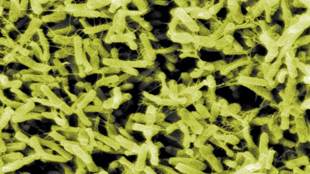 PUBLIC HEALTH IMAGE LIBRARY, CDCClostridium difficile (C. diff) infection can cause severe diarrhea and cramping, often leading to hospitalization. Transplantation of donor feces containing normal gut bacteria via enema, colonscopy, or nose tube has been shown to be an effective treatment for this often recurring infection. But a report presented this month (October 3) at IDWeek 2013, an international meeting of infectious disease specialists in San Francisco, has shown that less off-putting oral fecal capsules also work.
PUBLIC HEALTH IMAGE LIBRARY, CDCClostridium difficile (C. diff) infection can cause severe diarrhea and cramping, often leading to hospitalization. Transplantation of donor feces containing normal gut bacteria via enema, colonscopy, or nose tube has been shown to be an effective treatment for this often recurring infection. But a report presented this month (October 3) at IDWeek 2013, an international meeting of infectious disease specialists in San Francisco, has shown that less off-putting oral fecal capsules also work.
A University of Calgary group, let by physician Thomas Louie, used centrifugation to collect sediment containing beneficial microbes from feces of healthy donors (usually patient relatives) and then packaged the sediment in gelatin capsules. Patients who had experienced at least three severe C. diff infections took one dose of two to three dozen fecal pills over about 15 minutes on an empty stomach. None of the 27 patients who received the treatment in 2010 has since relapsed.
“The approach that Dr. Louie has is completely novel—no one else has done this,” Curtis Donskey, an associate professor of medicine at Case Western Reserve University in Cleveland and a physician the Cleveland Veterans Affairs Medical Center, told the Associated Press. “I am optimistic that this type of ...




















